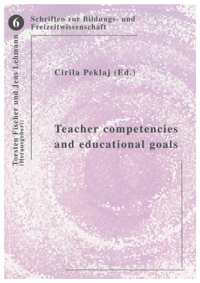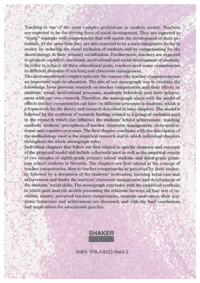
Shop : Details
Shop
Details
26,80 €ISBN 978-3-8322-9661-2Softcover174 pages12 figures257 g21 x 14,8 cmEnglishReference book
December 2010
Cirila Peklaj (Ed.)
Teacher competencies and educational goals
Teaching is one of the most complex professions in modern society. Teachers are expected to be the driving force of social development. They are expected to "equip" students with competencies that will enable the development of their potentials. At the same time they are also expected to be a socio-integrative factor in society by reducing the social exclusion of students and by compensating for the shortcomings in their primary socialisation. Furthermore, teachers are expected to promote cognitive, emotional, motivational and social development of students. In order to achieve all these educational goals, teachers need many competencies in different domains of teaching and classroom management.
The abovementioned complex tasks are the reasons why teacher competencies are an important topic in education. The aim of our monograph was to combine the knowledge from previous research on teacher competencies and their effects on students' social, motivational processes, academic behaviour and their achievement with our own research. Therefore, the monograph starts with the model of effects teacher competencies can have on different processes in students, which is a framework for the theory and research described in later chapters. The model is followed by the synthesis of research findings related to a group of variables used in the research which can influence the students' school achievement: teaching methods, students' perceptions of teacher classroom management, socio-motivational and cognitive processes. The first chapter concludes with the description of the methodology used in the empirical research and to which individual chapters throughout the whole monograph refer.
Individual chapters that follow are first related to specific elements and concepts of the proposed model and include a theoretic part as well as the empirical results of two samples of eighth-grade primary school students and third-grade grammar school students in Slovenia. The chapters are first related to the concept of teacher competencies, then to teacher competencies as perceived by their students, followed by a discussion of the students' motivation, learning behaviour and achievement and finally the teachers' classroom management and development of the students' social skills. The monograph concludes with the empirical synthesis in which path analysis models presenting the relations between all four sets of variables, namely perceived teachers competencies, students motivation, their academic behaviour and achievement are discussed, and with the final conclusions and implications for educational practice.
The abovementioned complex tasks are the reasons why teacher competencies are an important topic in education. The aim of our monograph was to combine the knowledge from previous research on teacher competencies and their effects on students' social, motivational processes, academic behaviour and their achievement with our own research. Therefore, the monograph starts with the model of effects teacher competencies can have on different processes in students, which is a framework for the theory and research described in later chapters. The model is followed by the synthesis of research findings related to a group of variables used in the research which can influence the students' school achievement: teaching methods, students' perceptions of teacher classroom management, socio-motivational and cognitive processes. The first chapter concludes with the description of the methodology used in the empirical research and to which individual chapters throughout the whole monograph refer.
Individual chapters that follow are first related to specific elements and concepts of the proposed model and include a theoretic part as well as the empirical results of two samples of eighth-grade primary school students and third-grade grammar school students in Slovenia. The chapters are first related to the concept of teacher competencies, then to teacher competencies as perceived by their students, followed by a discussion of the students' motivation, learning behaviour and achievement and finally the teachers' classroom management and development of the students' social skills. The monograph concludes with the empirical synthesis in which path analysis models presenting the relations between all four sets of variables, namely perceived teachers competencies, students motivation, their academic behaviour and achievement are discussed, and with the final conclusions and implications for educational practice.
Keywords: educational psychology; teacher competencies; educational goals; motivation; social processes; academic behaviour; achievement
Schriften zur Bildungs- und Freizeitwissenschaft
Edited by Prof. Dr. Torsten Fischer and Jens Lehmann, Güstrow / Lüneburg
Volume 6
Available online documents for this title
You need Adobe Reader, to view these files. Here you will find a little help and information for downloading the PDF files.
Please note that the online documents cannot be printed or edited.
Please also see further information at: Help and Information.
Please also see further information at: Help and Information.
| Document |  | Abstract | ||
| Type |  | |||
| Costs |  | free | ||
| Action |  | Download the file | ||
| Document |  | Document | ||
| Type |  | |||
| Costs |  | 20,10 € | ||
| Action |  | Purchase in obligation and download the file | ||
| Document |  | Table of contents | ||
| Type |  | |||
| Costs |  | free | ||
| Action |  | Download the file | ||
User settings for registered online customers (online documents)
You can change your address details here and access documents you have already ordered.
User
Not logged in
Export of bibliographic data
Shaker Verlag GmbH
Am Langen Graben 15a
52353 Düren
Germany
Am Langen Graben 15a
52353 Düren
Germany
Mon. - Thurs. 8:00 a.m. to 4:00 p.m.
Fri. 8:00 a.m. to 3:00 p.m.
Fri. 8:00 a.m. to 3:00 p.m.
Contact us. We will be happy to help you.



